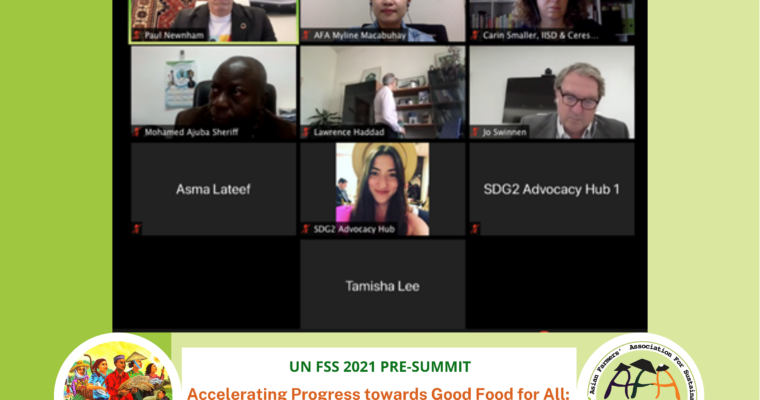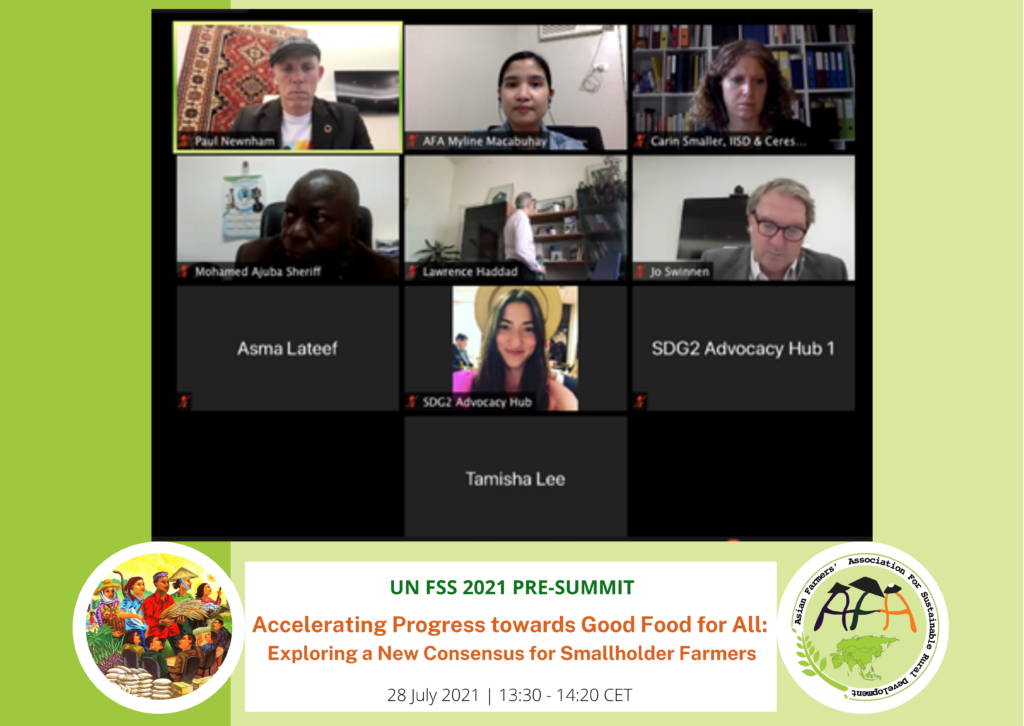“Good food begins with farmers”. This is the rationale of the UN FSS pre-summit affiliated session organized by the SDG2 Advocacy Hub and the International Institute for Sustainable Development (IISD) last 28 July 2021, 13:30 CET via Zoom.
There are a lot of stakeholders working towards achieving the SDG 2 target of eliminating hunger, and the UN Food Systems Summit provides an opportunity for coordinated action. In particular, several reports released in recent years such as Ceres2030, the SOFI, PARI 2020, and Foresight 2.0 highlight the growing need for a policy consensus for smallholder farmers that will “accelerate progress towards good food for all”. As such, the affiliated session brings together the following speakers from farmers’ organizations, NGOs, research organizations, and government to share their views on how the new policy consensus should look like:
- Carin Smaller – Agriculture, Trade & Investment, for the Economic Law and Policy program at the International Institute for Sustainable Development (IISD)
- Myline Macabuhay – Coordinator for the Land Rights and Young Farmers Agenda of the Asian Farmers Association for Sustainable Rural Development (AFA)
- Tamisha Lee – President of the Jamaica Network of Rural Women Producers
- Mohamed Ajuba Sheriff – Deputy Director-General of the Ministry of Agriculture and Forestry, Sierra Leone
- Johan Swinnen – Director-General of the International Food Policy Research Institute (IFPRI) and Global Director for Systems Transformation of CGIAR
- Dr. Lawrence Haddad – Executive Director of the Global Alliance for Improved Nutrition
Ms. Macabuhay shared some of the priority actions needed to lift farmers out of hunger and poverty and to double their incomes and productivity, based on AFA’s work with farmer organizations in the Asian region. Below is a transcript of her intervention:
“Many thanks Paul for the question. It’s quite ironic that while family farmers are responsible for producing 80% of the world’s food in value terms, poverty continues to be widespread in rural areas and many farmers live on less than a dollar a day.
The causes of hunger and poverty among farmers are numerous—and it would require as many solutions to address them, but let me cite a few priority actions that would support farmers in their role as the backbone of our food systems.
First, we have to promote secure tenurial rights of small-scale family farmers over land and natural resources. Farmers who have rights to land can cope with and recover from stresses and shocks and maintain or enhance its capabilities and assets now and in the future, while not undermining the natural resource base. We should invest in technical and institutional infrastructure for efficient and equitable land tenure administration, ensuring property rights for both men and women.
Second, we have to promote agroecological family farming systems and practices. Agricultural intensification has dominated food production in recent years, but it is also one of the major contributors to wicked environmental problems—from biodiversity loss to climate shocks and disasters. Family farmers have the knowledge to support food production and food security and nutrition while restoring the ecosystem services and biodiversity. What we need now are policies and agricultural extension services that promote these traditional knowledge and practices, and ensure that they are economically viable for family farmers and consumers.
Third, we need to build and strengthen family farmers cooperatives and their enterprises. This will give farmers stronger involvement in value chains and increase their market power. Cooperative provide the opportunity for farmers to raise their incomes—they are also democracies empowering people to own their own solutions. Policies and programs that render financial and technical support to cooperatives are needed to allow them to expand and diversify their business operations.
Fourth, we need to promote gender equity in agriculture. By any indicator of human development, female power and resources are lowest in rural areas of the developing world. Although women substantially contribute to household well-being and agricultural production, men largely control the land, the sale of crops and animals, and the use of income. We need policies and programs that empower women—providing them control over household and agricultural resources and increased access to financial services and skills development, information about markets, among others.
Lastly, we need to address the “graying” of the agriculture sector. Despite the high proportion of young people in Asia, the average age of farmers remains high. This is a result of the convergence of several factors affecting family farmers in general, and young farmers in particular such as lack of access to knowledge, information and education, limited access to land, inadequate access to financial services, limited access to markets, and limited involvement in dialogue.
Thus, a new policy consensus should not just be one action, but should be composed of several set of actions working synergistically to address not only the aforementioned issues, but also empower its key actors—the family farmers and their organizations. Carin has already highlighted it — FOs can serve as the platform that will provide the broad range of support that family farmers need, while at the same time elevating the voices of individual farmers into policy and program interventions. We need to recognize FOs as solution providers, as accelerators of SDGs, and as propellers of climate resilient agriculture. This recognition should come with tangible support—that is direct financing and investments to FOs through the establishment of grant facilities and funds.”
Paul Newman, Director of the SDG2 Advocacy Hub and moderator of the session noted that the session was just the beginning of the conversation. The next few weeks and months will be dedicated to collaborating with diverse stakeholders to deepen the conversation and begin to build the policy consensus and accelerate progress towards ending hunger and malnutrition by 2030.





Comments are closed